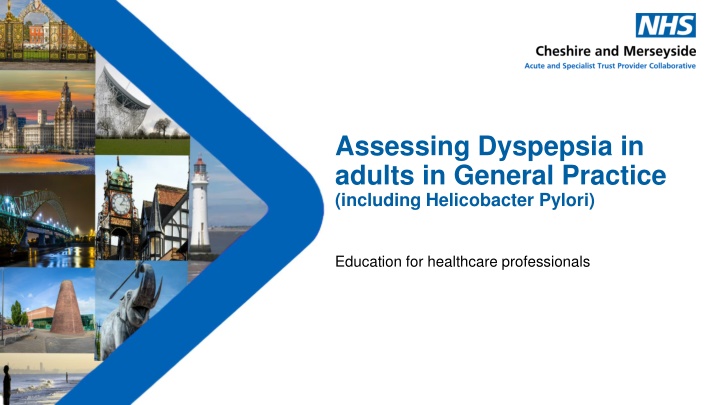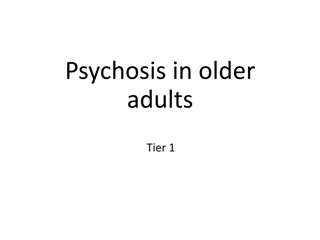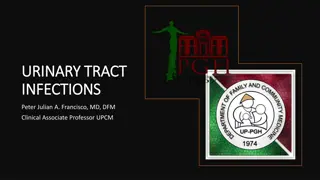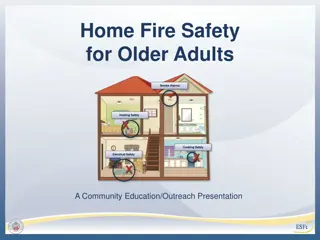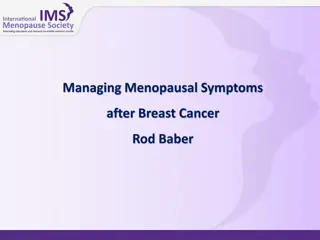Assessing Dyspepsia in Adults: Common Symptoms and Management
Dyspepsia is a prevalent condition characterized by upper gastrointestinal symptoms like abdominal pain, heartburn, and nausea. Effective management is crucial due to its impact on morbidity and unnecessary investigations. Individuals aged 55 and above with treatment-resistant dyspepsia may signal potential cancer, necessitating a comprehensive assessment. Alarm symptoms, lifestyle factors, and family history should be considered during evaluation to identify complications or serious underlying issues.
Download Presentation

Please find below an Image/Link to download the presentation.
The content on the website is provided AS IS for your information and personal use only. It may not be sold, licensed, or shared on other websites without obtaining consent from the author.If you encounter any issues during the download, it is possible that the publisher has removed the file from their server.
You are allowed to download the files provided on this website for personal or commercial use, subject to the condition that they are used lawfully. All files are the property of their respective owners.
The content on the website is provided AS IS for your information and personal use only. It may not be sold, licensed, or shared on other websites without obtaining consent from the author.
E N D
Presentation Transcript
Assessing Dyspepsia in adults in General Practice (including Helicobacter Pylori) Education for healthcare professionals
What are we referring to The term 'dyspepsia' is used to describe a number of upper gastrointestinal tract symptoms which are typically present for four or more weeks & may include any of the following: Upper abdominal pain or discomfort Heartburn Acid reflux Nausea and/or vomiting
Dyspepsia is very common Dyspepsia symptoms are estimated to occur in about 40% of the population each year optimal management is therefore key due to the numbers affected and the impact on morbidity, the potential for unnecessary prescribing burdens (both in cost and side effects) and pursuing investigations which may not always be necessary https://cks.nice.org.uk/topics/dyspepsia-unidentified-cause/references/
To note: Dyspepsia in those 55yrs and above which is treatment resistant or present with other key symptoms may be a marker of oesophageal or stomach cancer which is why a thorough assessment of dyspepsia is essential. https://www.nice.org.uk/guidance/ng12/chapter/Recommendations-organised-by-site-of-cancer
Remember to Ask about any alarm symptoms that may suggest a complication or other serious underlying pathology, and manage appropriately e.g. fast track suspected cancer referral Ask about any family history of upper gastrointestinal malignancy or Lynch syndrome Assess for stress, anxiety, and depression which may worsen symptoms Assess any lifestyle factors that may cause or exacerbate symptoms: Obesity Any trigger foods, such as coffee, chocolate, tomatoes, fatty or spicy foods The person's pattern of eating e.g. missing meals, consuming large meals, or eating shortly before bed Smoking status Alcohol consumption
Remember to Examine the person, to assess for: Weight loss Signs of anaemia Abdominal mass Tenderness Consider arranging: full blood count, to check for anaemia and/or a raised platelet count (associated with LEGO-C lung, endometrial, gastric, oesophageal and colorectal cancers )
Check the patients medication in detail Both prescribed and over the counter Ask about over the counter medication such as antacids, alginates and PPIs that have been tried for symptom relief and advise long-term, continuous use is NOT recommended (as per NICE Guidelines) Consider reducing or stopping (if possible and appropriate) any drugs that may cause or exacerbate dyspepsia, such as: Alpha-blockers Anticholinergics Aspirin Benzodiazepines Beta-blockers Bisphosphonates Calcium-channel blockers Corticosteroids Nitrates Nonsteroidal anti-inflammatory drugs (NSAIDs) Theophyllines Tricyclic antidepressants
Other conditions to consider Other conditions which may also present with dyspepsia symptoms & might therefore be considered depending on the patient s presentation include: Gallbladder or hepatobiliary disease Pancreatic disease Cardiac disease Gastroenteritis Coeliac disease Crohn's disease Small intestine bacterial overgrowth may also present with weight loss, chronic diarrhoea, and malabsorption Irritable bowel syndrome Abdominal aortic aneurysm (rare)
Helicobacter pylori (HP) who to test The prevalence of HP in developed countries is falling, and is lower than 15% in many areas in the UK, higher in older people; people of North African ethnicity and those living in a known high risk area What NICE says: Test for Helicobacter pylori infection if the person's status is not known or uncertain - If the person tests positive for H. pylori infection, prescribe according to Pan Mersey Formulary (panmerseyapc.nhs.uk) Cheshire Formulary (cheshireformulary.nhs.uk) or locally agreed treatment protocols Note: Both HP and NSAIDs are independent risk factors for peptic ulcers, so eradication will not remove all risk
Dyspepsia in pregnancy affects circa 80% Raised levels of oestrogen and progesterone in pregnancy are responsible for reducing the lower oesophageal sphincter pressure, meaning that pregnant women can experience reflux from quite early on in a pregnancy. There is the obvious impact of the foetus on intra-abdominal pressure, which increases as the pregnancy progresses. Assessment should be exactly the same as in non-pregnant patients with the addition of pregnancy-related disorders: Nausea and vomiting of pregnancy, including hyperemesis gravidarum. For more information, see the CKS topic on Nausea/vomiting in pregnancy Pre-eclampsia for more information, see the CKS topic on Hypertension in pregnancy HELLP syndrome (haemolysis, elevated liver enzymes, and low platelets) Acute fatty liver of pregnancy (rare) Dyspepsia Pregnancy Associated NICE
In summary Assessing Dyspepsia in General Practice Always assess for red flags especially in those 55yrs and above Always check medication as a cause/trigger for dyspepsia including over the counter sources A thorough assessment of lifestyle factors is key in planning interventions for treatment Check for HPylori where indicated Management and Treatment of Dyspepsia in adults in General Practice is described in the next section
